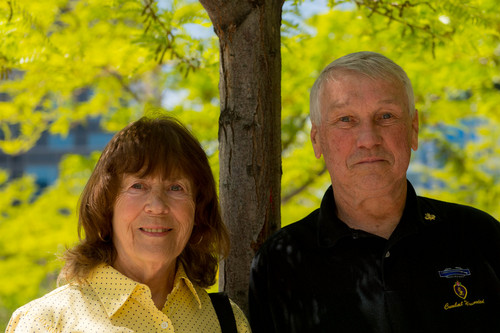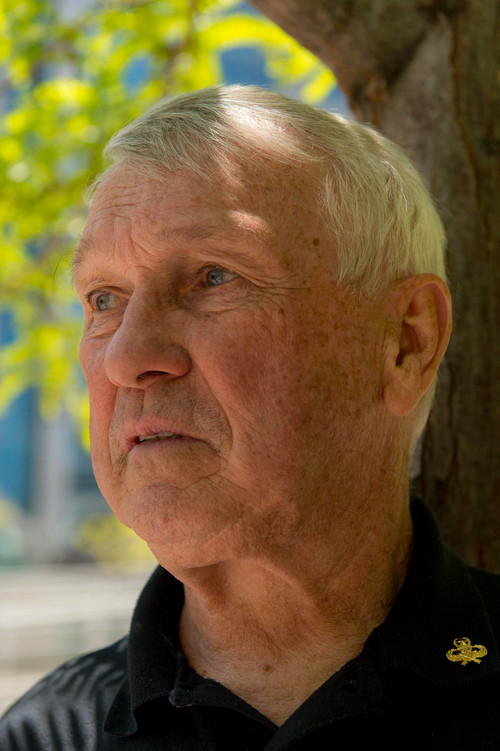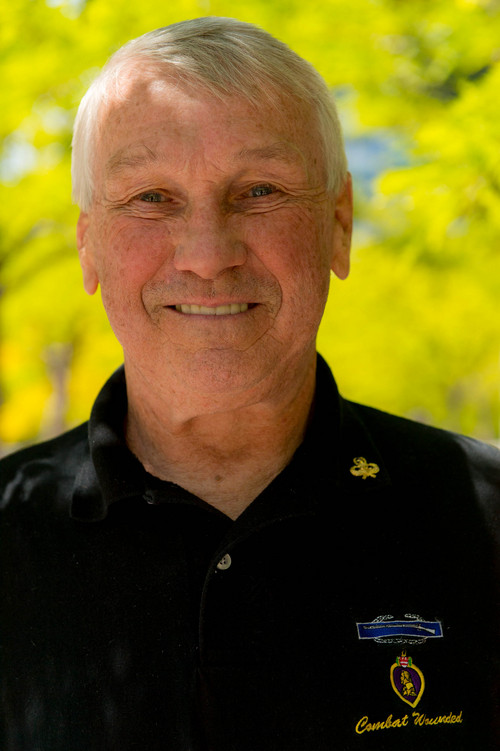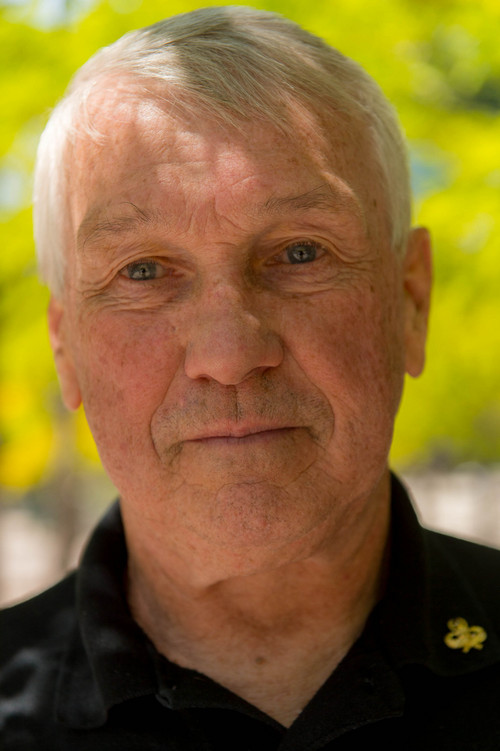This is an archived article that was published on sltrib.com in 2014, and information in the article may be outdated. It is provided only for personal research purposes and may not be reprinted.
The Viet Cong soldier stood in the doorway, ready to throw a satchel full of explosives into the building where Staff Sgt. Patrick Watkins had been sleeping.
Through the darkness, Watkins fired his .45-caliber pistol twice. The bullets struck and soon killed the Vietnamese soldier, but first he rolled a grenade toward Watkins.
Watkins yelled, "Grenade," ducked and covered his head. Shrapnel peppered Watkins.
"I tried to get up, and I fell down," the 76-year-old Watkins explained Tuesday. "I knew I had a concussion."
But Watkins would get to his feet, pick up his gun again and organize a rescue for other U.S. soldiers pinned down and buried underneath debris by the Viet Cong who attacked their camp that night near Da Nang, Vietnam. Next week at a ceremony in Florida, Watkins will receive the Distinguished Service Cross for his actions.
The Distinguished Service Cross is the second-highest honor for a member of the U.S. Army — behind only the Medal of Honor.
Watkins is believed to be the only Utahn from the Vietnam War to receive the medal. And the honor might solidify Watkins' place as the state's most highly decorated living veteran. He already has five Bronze Stars, two Army Commendation Medals, two Meritorious Service Medals and three Air Medals.
He also has two Purple Hearts, one of which he received for his wounds in the attack that night in Da Nang at Forward Operating Base 4.
Watkins was assigned to the 5th Special Forces Group and spent much of the war in counterinsurgency operations in Cambodia and Laos. Forward Operating Base 4 was considered a top-secret facility. But it was not well guarded, according to Watkins and written accounts. There was some barbed-wire fencing patrolled by South Vietnamese security — or, as Watkins called them, "rent-a-cops."
The1968 attack began late Aug. 22 or early on Aug. 23. The Viet Cong sent about 250 soldiers from an elite unit called "Sappers" that specialized in attacking bases. Battle accounts suggest the Viet Cong were aided by Vietnamese working with the Americans inside the base.
"They didn't come in to control the compound and keep it," Watkins said Wednesday during an interview at the Gallivan Center in downtown Salt Lake City. "They came in to kill people."
Watkins was asleep in a room with another staff sergeant and two recently arrived second lieutenants when the Sappers attacked. At first, Watkins woke to the sound of incoming mortar fire. He and Staff Sgt. Joseph Conlon covered themselves with their mattresses.
Watkins then heard a neighboring building explode, followed by AK-47 fire. He realized the enemy was inside the camp.
One of the lieutenants went to the window. A bullet struck him. Another building exploded, collapsing some of the ceiling on top of Watkins and his roommates.
Watkins knew their building would be targeted. He ordered Conlon to cover the rear with his rifle. Watkins covered the front, where he encountered the Sapper.
After the grenade went off, Watkins, told the healthy lieutenant to secure the building. Watkins and Conlon went outside. The Sappers had overrun the base. Intense gun battles raged.
The only light, Watkins said, came from muzzle flashes and explosions. About an hour into the battle, a C-47 flew over and dropped flares.
Watkins tried to organize the U.S. soldiers to create a perimeter around their section of the camp and to search for survivors.
"We basically, the rest of the night, went trying to find wounded," Watkins recalled. Fighting the Sappers was secondary.
Many of the soldiers Watkins organized had just arrived in Vietnam. Others were radio operators or had other jobs that — until then — had kept them out of combat, Watkins said.
Decades later, a group of survivors submitted affidavits in support of Watkins' medal. Conlon told how Watkins saved lives when the headquarters was attacked.
Medic Bob Scully was shot and left by Sappers as bait to would-be rescuers.
"Watkins threw himself on top of Scully to protect him from the blast [of a grenade] and was wounded again. ... then picked Scully up and carried and passed him through heavy fire to the edge of the building," Conlon wrote. " ... Though wounded multiple times, Staff Sgt. Watkins ignored his own painful injuries and continued the search for the wounded, and through his indomitable courage and bravery, he rallied others to follow."
Watkins said he killed at least three Sappers that night.
The battle lasted about seven hours. The Sappers retreated as the sun rose.
The attack killed 18 Americans, about 25 Vietnamese commandos working with the U.S. soldiers and about 75 Sappers. About 30 more Americans were wounded. It remains the single deadliest battle for the Army Special Forces.
Watkins was taken to a field hospital, wheremedics removed shrapnel from him. He then hitchhiked back to Forward Operating Base 4, because he did not want to divert attention from the more seriously wounded.
Watkins said his commanders submitted him for a medal shortly after the attack. He assumes nothing came of it because of how many Special Forces died and because they had been working in Cambodia and Laos — something the U.S. government did not acknowledge until years after the war.
Carol Watkins, his wife and a Marine Corps veteran, did not know here husband had been wounded that day and knew nothing about the battle until about five years ago, when others began to push for Watkins' medal.
"Pat just left everything behind when he came back," she said.
"There's no sense in bringing that back home," he added. "I was a professional soldier."
The couple hasbeen married 52 years. They met when they were both serving in the Marines.
Watkins was born in Michigan and mostly raised in Sullivan, Ind., though he said his family moved a lot, including a brief stay in Salt Lake City. He enlisted in theMarines in 1957. Seven years later, he joined the Army. Along the way, he and Carol had two daughters.
Watkins remained in the Army after the attack. In 1976, he requested a post teaching ROTC cadets at the University of Utah. He and this wife wanted to ski.
Watkins retired in 1980 as a master sergeant. He and his wife live in Taylorsville.
The May 22 ceremony in which Watkins will receive the Distinguished Service Cross will be atEglin Air Force Base, Fla. It's home to the 7th Special Forces Group. Attendees are to include a four-star Army general.
"I served among heroes," Watkins said. "I'm not a hero."
Twitter: @natecarlisle —
Trib Talk on Wednesday — Veterans
Despite the recent controversy, there are signs that health care for veterans is slowly improving. On Wednesday at 12:15 p.m., former Utah Veteran's Affairs Director Terry Schow and Tribune military reporter Nate Carlisle join Jennifer Napier-Pearce to talk about the progress being made for Utah veterans and what's left to do. http://www.sltrib.com









